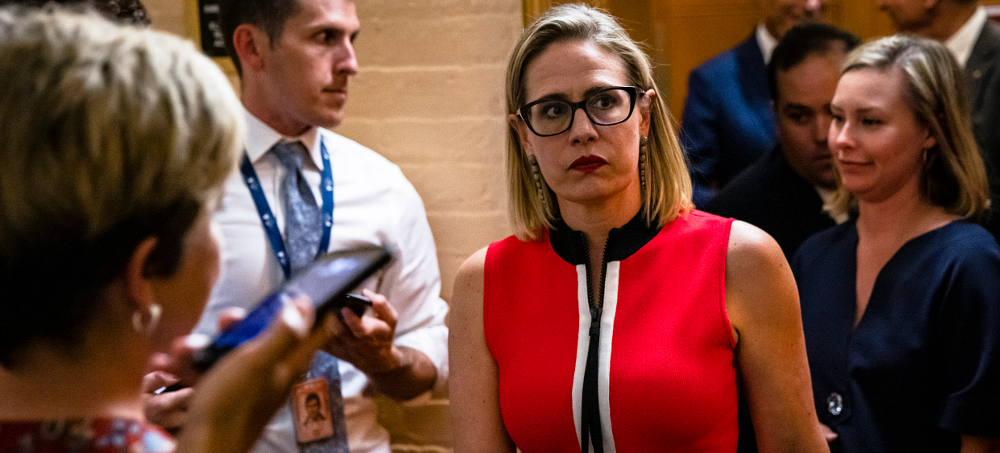The Bottomless Emptiness of Manchema
Sarah Jones New York Magazine Kyrsten Sinema is begging for a primary challenge. (photo: Michael Brochstein/Shutterstock)
01 October 21
Kyrsten Sinema is begging for a primary challenge. (photo: Michael Brochstein/Shutterstock)
01 October 21
Joe Manchin of West Virginia and Kyrsten Sinema of Arizona appear to relish the power they wield over the rest of the party. They are, in effect, holding the president’s priorities hostage to their personal whims. That’s not a new story in politics. But their stubbornness in the face of contemporary challenges reveals the bottomless emptiness of their brand of centrist politics.
Manchin and Sinema say they are worried about the money, so much so that Manchin has called for a “strategic pause” on the bill. “I, for one, won’t support a $3.5 trillion bill, or anywhere near that level of additional spending, without greater clarity about why Congress chooses to ignore the serious effects inflation and debt have on existing government programs,” he wrote in an op-ed for The Wall Street Journal. As countless wonks have pointed out, however, the bill is largely paid for and should have minimal effect on inflation and the national debt.
Though it has been reported that she is against the tax hikes in the bill, Sinema, as is her wont, appears reluctant to explain her motivations to the public. In ongoing one-on-one negotiations with Biden himself, she has reportedly refused to name a price tag that is acceptable to her. If there is any genuine policy thinking at all behind her recalcitrance, it has yet to emerge.
News that she is about to raise money from business interests that oppose the budget bill has invited speculation that she is doing her donors’ bidding. Meanwhile, the budget’s climate provisions disturb Manchin, who makes a sizable profit from the coal industry. Perhaps plain old corruption is at work here.
But there is more to it than that. Everyone involved in this saga, from President Biden down, is making a moral choice. The president’s budget is, like all presidential budgets, a public expression of the administration’s values. Sinema and Manchin have also expressed their values in public, even though these are cloaked in boilerplate rhetoric about inflation and taxes. Sinema’s donors are a reflection of her personal priorities. The same is true for Manchin when it comes to the profit motive. They’ve chosen their benefactors, not their voters, as their real constituency.
The Build Back Better plan is broadly popular with the American public, Data for Progress reports. Certain provisions, like the budget’s investment in home care, are even more popular than the overall plan, evidence that voters want something more robust than a highway bill. The popularity of the president’s agenda strikes down a key claim put forward, often by moderate Democrats and their defenders: that they’re limited by what their red-state voters want.
It’s obvious that Manchin and Sinema are doing what they want to do, not what their voters want. Nor are they motivated by what their voters need — a slightly different question that is nevertheless highly relevant to the fate of the Biden budget.
The planet is warming, whether Joe Manchin wants to admit it or not. The rampant inequality exposed by COVID can only be solved through greater public spending. If the Democratic Party wants to guarantee a livable future for the public, it is going to have to act while it can. Through their intransigence, these two moderates haven’t just jeopardized what might be Biden’s signature policy achievement. They’ve done more than undermine their party’s electoral future (why should voters support a party that wasted the power they gave it?). They are sacrificing the future itself.
And for what? Manchin is genuinely vulnerable to a challenge from the right in a deep-red state, but Sinema is not. In fact, she has practically guaranteed herself a primary challenge that she’s poorly positioned to win. The Sinema and Manchin school of politics defies reality, and common sense along with it. It has never been more apparent that the real threat to the president is not the left — which has emerged as the strongest defender of the Biden agenda — but the centrists. They have no vision. Asked, repeatedly, by the president, their colleagues, and nearly everyone else what it would take for them to support the spending package in question, they have little to say.
That’s a telling silence. Some version of the bill may well pass, but these tortured negotiations have exposed the barrenness of their position. Sinema and Manchin have a way of doing politics that redounds to no one else’s benefit, and sometimes not even themselves. They are risking Biden’s legacy, the prospects of their party, and the well-being of the American public for reasons they can’t even articulate. If only they were capable of shame.



